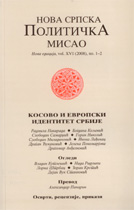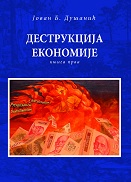| NSPM in English | |||
New focus on the Western Balkans |
 |
 |
 |
| среда, 02. април 2008. | |
|
Notable was the presence at Brdo of both Serbian Foreign Minister Jeremić as well as Kosovo PM Thaci. The EU acknowledged in February that the decision to recognize Kosovo is left to individual Member States, but this does not change the common commitment Kosovo should take part into the regional co-operation and benefit from the EU perspective for the region, of which it is a part. We are revealing no secret by saying that Serbia was at the centre of attention at Brdo. As one of our colleagues said on Saturday, we all want for Serbia the same that Slovenia – once Serbia 's fellow republic in former Yugoslavia , now presiding the EU – had achieved. The Stabilization and Association Agreement with Serbia was initialled last November and now waits to be signed. Undoubtedly, Serbia needs to meet its international and moral obligations in order to join the EU family. We understand that Serbia on the eve of elections is uncertain about its future and lukewarm about Europe. It is therefore the conviction of both the current and the future EU Presidencies that partners need to find innovative ways to give Serbia 's pro-European forces this much needed boost, while not compromising on values on which the EU is based. As Kosovo, Serbia is in many respects a unique case too. For this reason as proposed in Brdo, we want to show the willingness of the EU towards the people Serbia and put forward the proposal of trying to get a free of charge visa regime towards Serbia. We will, however, insist firmly that Serbia respect previously made commitments and refrain from any inflammatory rhetoric or activities which might endanger the security situation in the region. We fully respect the feelings of our Serbian friends, but good regional co-operation is one of the conditions for the EU aspiring countries and this goes as well for Serbia. And EULEX and EUSR missions to Kosovo are a sign of the EU commitment for Kosovo. One cannot at the same time aspire to join EU while refuse talking to its missions that are there for the sake of Kosovo Serbs in the first place. Above all, Serbia should not let the Kosovo issue to determine its relationship with the EU. One measure that could win hearts and minds of people in the Balkans is to continue working on the visa-liberalisation plans for all countries of the region by completing soon the so- called roadmaps, setting down realistic and concrete conditions which, if and when met, would open way to visa-free travel. We should not discount the frustrating paradox of the fact that the countries of former Yugoslavia already had the experience of visa-free travel before 1990. While our eyes have recently been – for very obvious reasons – focused on Serbia and Kosovo, we should not forget about the rest of the region. The progress made recently by Montenegro and Albania should be recognised. In Bosnia-Herzegovina, the signing of the Stabilization and Association Agreement is within reach, provided that police reform is implemented – in the next couple of days, the parliament of BiH will have another opportunity to make bold and courageous moves on this matter. Finally, our special attention goes to the former Yugoslav Republic of Macedonia . We have been encouraged by some progress made in the last couple of days on the name issue and we sincerely hope that mutually acceptable solutions will be followed allowing Former Yugoslav Republic of Macedonia to join Nato. This is the future of the country and its people, and has the real potential to make grow country stronger and the region more stable. Dr. Dimitrij Rupel, President of the EU General Affairs and External Relations Council, Minister of Foreign Affairs of Slovenia Bernard Kouchner, Minister of Foreign and European Affairs of F |
Од истог аутора
Остали чланци у рубрици
- Playing With Fire in Ukraine
- Kosovo as a res extra commercium and the alchemy of colonization
- The Balkans XX years after NATO aggression: the case of the Republic of Srpska – past, present and future
- Из архиве - Remarks Before the Foreign Affairs Committee of the European Parliament
- Dysfunction in the Balkans - Can the Post-Yugoslav Settlement Survive?
- Serbia’s latest would-be savior is a modernizer, a strongman - or both
- Why the Ukraine Crisis Is the West’s Fault
- The Ghosts of World War I Circle over Ukraine
- Nato's action plan in Ukraine is right out of Dr Strangelove
- Why Yanukovych Said No to Europe

.jpg)








 Ljubljana, 2 April 2008 - Last Saturday at Brdo, Slovenia, the 27 EU foreign ministers sent a clear message of reaffirmation of the EU perspective for the Western Balkans – a message much needed in the aftermath of the Kosovo independence, in advance of Bucharest NATO summit this week and ahead of parliamentary elections in Serbia in May.
Ljubljana, 2 April 2008 - Last Saturday at Brdo, Slovenia, the 27 EU foreign ministers sent a clear message of reaffirmation of the EU perspective for the Western Balkans – a message much needed in the aftermath of the Kosovo independence, in advance of Bucharest NATO summit this week and ahead of parliamentary elections in Serbia in May.












